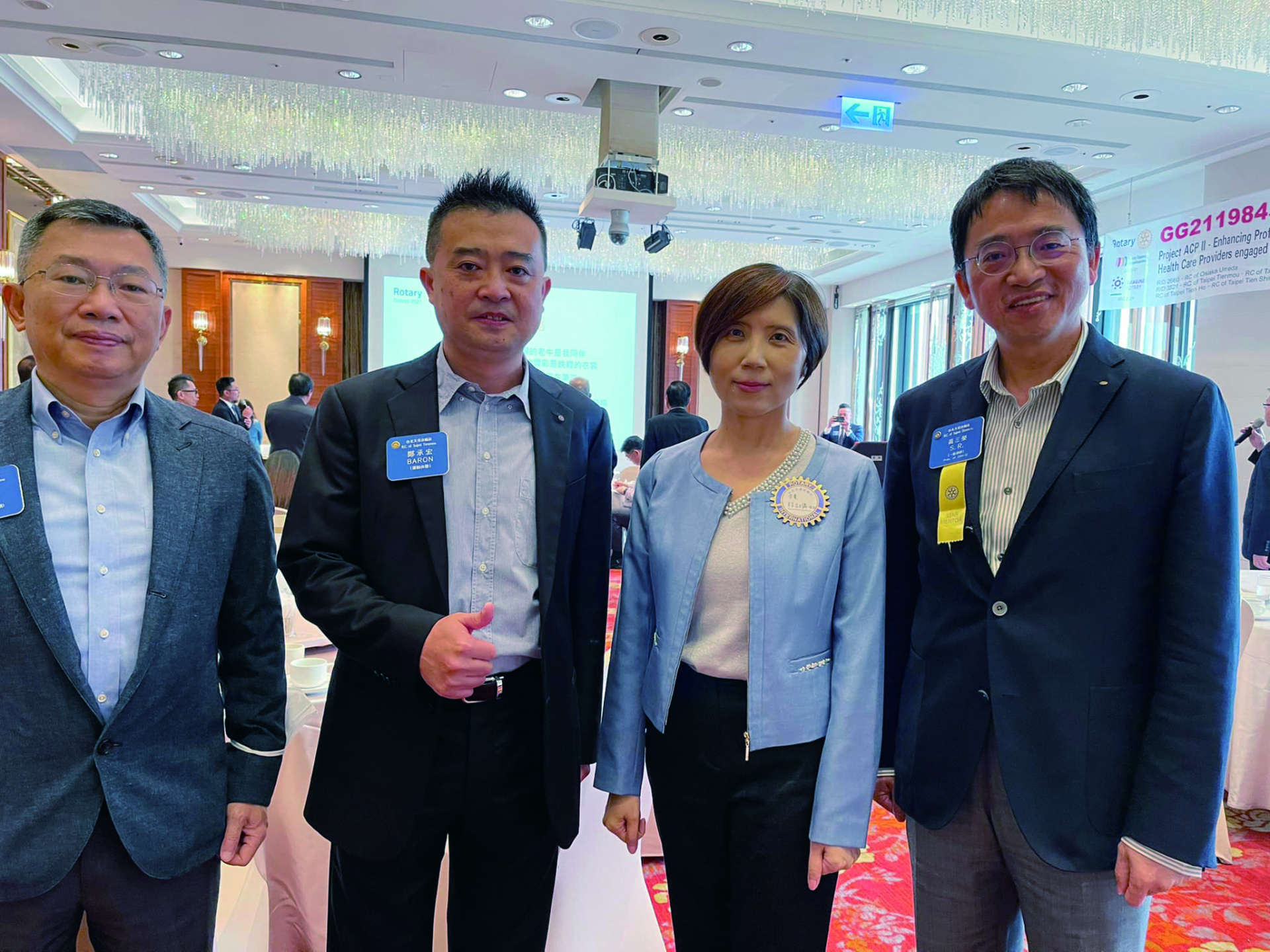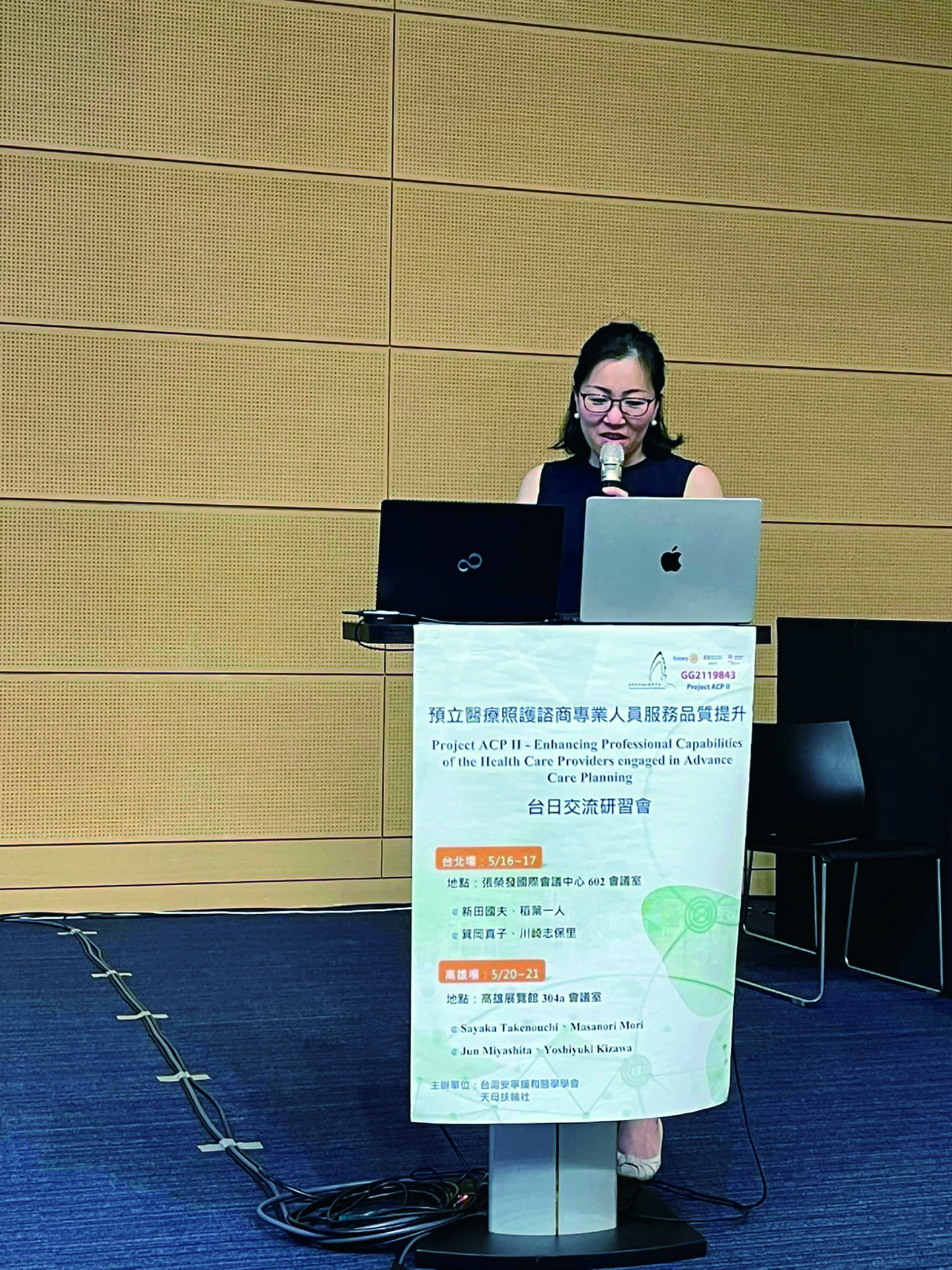The healthcare environments in Taiwan and Japan differ, and there are also disparities in the implementation and promotion of Advance Care Planning (ACP). In April of this year, the Taiwan Academy of Hospice Palliative Medicine, in collaboration with the Rotary Club of Taipei Tienmou, invited relevant experts and scholars from Japan to Taiwan for exchanges and conversations, aiming to share the similarities and differences in the promotion, research, advocacy, development, and implementation of ACP.
In the era of the approaching super-aged society, the issue of care for the elderly has been increasingly emphasized by various countries. Taiwan's concept of hospice and palliative care predates that of other Asian countries. Following the enactment of the Hospice and Palliative Care Act, the Patient Right to Autonomy Act was formally launched in early 2019. Although it has been in effect for four years, there is still room for improvement. With Taiwan entering a super-aged society in 2025, the issue of health care is urgent, and the implementation of the concept of hospice also needs new discussions.
Among Asian countries, Japan still lacks a specific legal framework for Advance Care Planning (ACP), but the development of hospice and palliative care is thriving. In order to encourage a different perspective among domestic healthcare professionals in promoting ACP, following the 2020 field trip to Japan organized by the Hospice Foundation of Taiwan, this year, in collaboration between the Rotary Club of Osaka Umeda, Japan, and the Rotary Club of Taipei Tienmou, Taiwan, with the Taiwan Academy of Hospice Palliative Medicine as a facilitator, the Japan Association for Clinical Ethics, Japanese Society for Palliative Medicine, and related experts and scholars were invited to Taiwan. Two seminars were held in Taipei and Kaohsiung, respectively, aiming to explore additional solutions for promoting ACP in Taiwan by drawing on Japan's implementation practices and perspectives on ACP.
Differences in ACP Implementation Between Taiwan and Japan
The promotion of ACP and the Patient Right to Autonomy Act in both Taiwan and Japan is notably similar to that of home medical care. Japan developed a local healthcare system integrated with long-term care in the 1980s, and the timeline for promoting ACP aligns closely with that of Taiwan. Both countries have exerted efforts to progress in terms of culture, law, and ethics, yet there remains a significant disparity in the actual implementation of ACP.
Shao-Yi Cheng, the President of the Taiwan Academy of Hospice Palliative Medicine, pointed out that both Taiwan and Japan are grappling with the challenges of an aging population and actively promoting ACP. However, the most significant disparity in the viewpoints and practices regarding ACP implementation between Taiwan and Japan lies in the approach. "Taiwan places significant importance on legislation to confer legal validity to the patient's signature on the Advance Decision (AD), thus emphasizing modifications to laws and regulations to safeguard the rights and interests of the signatory. In contrast, Japan does not primarily focus on legal perspectives but rather approaches ACP from philosophical and ethical concepts to contemplate life issues. Japan also encourages local governments to integrate ACP with the home medical care system."
"Japan's emphasis on the popularity rate, allowing individuals to learn about ACP and sign it through a doctor they know well, is linked to Japan's active promotion of home medical care," Shao-Yi Cheng explained. She further noted that Japan lacks specific legislation or legal protection for ACP. "In fact, clinical guidelines developed by local governments and medical associations vary, and there is no standardized AD form as seen in Taiwan. Instead, the focus is on collaboration with local medical care and implementation in the home medical care sector."
Still Room for Progress in Promoting ACP in Taiwan
Currently, there are about 4 million elderly people in Taiwan, with over 200,000 deaths each year. Four years after the promotion of the Patient Right to Autonomy Act, only fewer than 50,000 people have signed the AD, which is less than 2% of the total population. Hence, there is indeed room for progress.
According to Shao-Yi Cheng's research, she stated, "Taiwan's population actually has a high level of acceptance of patient autonomy." A few years ago, the Department of Family Medicine at National Taiwan University Hospital (NTUH) collaborated with Kyoto University in Japan on a study comparing the acceptance of ACP in Taiwan and Japan. The study aimed to investigate at which stage of the disease it is most appropriate for ACP to intervene and be discussed. The results revealed that both in Taiwan and Japan, patients preferred their doctors to initiate discussions as early as possible.
"The results of this study have overturned our expectations. We used to think that people would prefer ACP to intervene only as a last resort, but the fact is that people in Taiwan are even more inclined than in Japan to want ACP to intervene as early as possible." Shao-Yi Cheng sees significant potential in Taiwan, where the concept of hospice and palliative care has been consciously embraced both legally and by the public. However, the reasons for the lack of success are likely to be multifaceted.
"The high cost of counseling is a significant deterrent," she pointed out. While Taiwan's healthcare system is robust and medical costs are low, asking the public to spend thousands of dollars on ACP consultation is challenging. "It now appears that only individuals from specific classes, such as those with financial means and knowledge, are willing to invest the time and money to go to the hospital for consultation and signing. Encouraging the public to visit hospitals to sign the AD is even more challenging, and the recent outbreak of the COVID pandemic has further hindered patients' willingness to go to the hospital for AD signing."

Certainly, insufficient publicity and accessibility are also contributing factors. Shao-Yi Cheng shared her experience abroad: In Europe and the United States, some hospitals include health education leaflets in the information provided to patients upon admission. This allows patients and their families to have time to learn about it. "In fact, Taipei City Hospital has done an excellent job by organizing large-scale lectures, enabling the public to sign the leaflet immediately after the event." She suggested that in the future, the health education leaflet could be transformed into a simplified version of an app. This way, patients or their families can quickly receive relevant information while waiting for appointments, making them more willing to consult with a doctor for further understanding.
For example, in Japan, the process of promoting ACP does not have restrictions limiting its implementation to hospitals, and there is no specific consultation and document signing process. Instead, it emphasizes the establishment of a strong doctor-patient relationship between healthcare workers and patients through repeated communication during the treatment process. This approach aims to help the public understand the significance of a good death. "Japan believes that ACP is a process of assisting patients in moving towards a good death. It requires a long period of delicate participation and care to slowly build up a good doctor-patient relationship and then discuss the matter step by step." This is a valuable aspect worth learning from.
"The lack of personalization in ACP is also a problem," said Shao-Yi Cheng. She added that standardized forms may not be suitable for patients at all stages of their illnesses. "As their conditions change, they should be able to make choices at different stages." Therefore, she suggested that if there is an opportunity to launch ACP version 2.0, consideration could be given to providing multiple options. Government subsidies for the elderly or care recipients in long-term care organizations could be implemented, allowing people with urgent needs to sign the form as a matter of priority.
Japan Emphasizes and Promotes Dying Well at Home
In 2019, Shao-Yi Cheng proposed the Taipei Declaration on Advance Care Planning, which was published in the Journal of Palliative Medicine and recognized as one of the earliest advance care guidelines in the Asia-Pacific region.
The declaration emphasizes that advance care is a process involving patients and their families in understanding the meaning of a good death. It involves discussing potential challenges with the healthcare team when the disease becomes incurable, covering physical, mental, spiritual, and social dimensions. The consideration of individual needs is highlighted, ensuring that the process meets the current needs of patients and families at any stage. The declaration suggests approaching this from multiple perspectives, including the patient, family members, healthcare professionals, trainers, researchers, and policymakers. It emphasizes an ethical foundation for execution to achieve its goals.
She believes that Japan's focus on promoting a good death at home is a crucial aspect for the future healthcare promotion in Taiwan. The promotion of community hospice care represents the final step in enabling patients to return home with peace of mind. It is essential to enhance and promote the capability of community doctors to care for patients returning home from the hospital. This ensures that patients and their family members can feel at ease. Additionally, establishing daycare centers in the community provides a space for communication and rehabilitation for patients returning home.
"In Taiwan, the fast-paced nature of medical care leaves healthcare workers with little time to engage in detailed discussions with patients about their end-of-life thoughts," she stated. She emphasized that learning from Japan's concept of integrating ACP into daily life is valuable. Establishing a gradual and strong doctor-patient relationship, gaining the trust of patients and their families, and bridging the aging and end-of-life processes are crucial. This approach ensures that end-of-life care becomes intimately connected with people's hearts, allowing life to reach its fullest potential.

